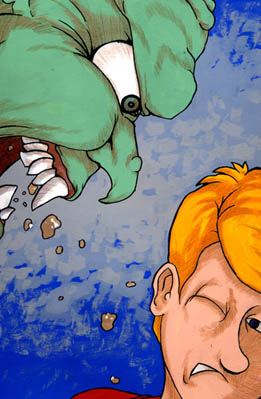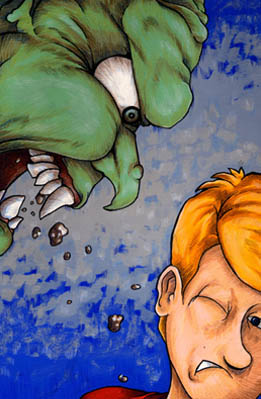by Anatoly Liberman
HOOSIER.
Almost exactly two years ago, on July 30, 2008, I posted an essay on the origin of the nickname Hoosier. In it I expressed my cautious support of R. Hooser, who derived the “moniker” for an inhabitant of Indiana from a family name. I was cautious not because I found fault with his reasoning but because it is dangerous for an outsider to express his opinion on a special subject; American onomastics (a branch of linguistics devoted to the study of names) is not my area. The bibliographers who had done outstanding work in listing the documents pertaining to Hoosier seem to have missed the article in Eurasian Studies Yearbook, 1999, 224-231. However, none of them reacted to my defense of the Hauser/Hoosier hypothesis either. Perhaps they missed that post: it is impossible to follow everything that appears in the Internet. Only Mr. J. Vanhoosier wrote a few words about the history of his family. His comment dates to February 2009. Mr. Randall Hooser (in Yearbook, his full name was not given) noticed my post in June 2010 and responded in some detail. Comments that are added so late have no chance of attracting my attention, because this weekly blog has existed for more than four years, but Mr. Hooser contacted me and sent me numerous supporting materials. His interpretation of historical evidence does not seem to be controversial, and I will deal only with the etymology of the nickname.
Mr. Hooser is not a linguist, and this is why he made too much of the fact that the High German au corresponds to long u (transliterated as Engl. oo) in Alsace, the homeland of the Hausers/Hoos(i)ers. But this correspondence needs no proof. In Middle High German, long i and u (transliterated by Engl. ee and oo) underwent diphthongization, which spread from Austrian Bavarian dialects in the 12th century and later became one of the most important features of the Standard. The “margins” of the German speaking world were unaffected by the change, so that the north (Low German) and the south (Alsace and Switzerland) still have monophthongs where they had them in the past. What has not been accounted for is the variant Hoosier as opposed to Hooser. In my 2008 post, I referred to such enigmatic American pronunciations as Frasier for Fraser and groshery for grocery, but analogs have no explanatory value. However, according to Mr. Hooser, linguists from Kentucky informed him that in the Appalachian area this type of phonetic change is regular, so that Moser becomes Mosier, and so forth. The cause of the change remains undiscovered. Although in this context the cause is irrelevant, I may note that in many areas of the Germanic speaking world one hears sh-like s, notably in Icelandic and Dutch, but not only there. Sh for s and zh (the latter as in Engl. pleasure, as you, and genre) for z characterized the earliest pronunciation of German. The Proto-Indo-European s was, in all likelihood, also a lisping sound. Perhaps the area from which the Hoosers migrated to America has just such a sibilant.
The original derogatory meaning of Hoosier is certain. Yet the word’s adoption by Indiana should cause no surprise; compare Suckers and Pukes for the inhabitants
By Anatoly Liberman
The young Dickens was the first to record the word kibosh. We don’t know for sure how it sounded in the 1830’s, but, judging by the spelling ky(e)-, it must always have been pronounced with long i. The main 19th-century English etymologists (Eduard Mueller, Hensleigh Wedgwood, and Walter W. Skeat) did not include kibosh in their dictionaries. They probably had nothing to say about it, though Mueller, a German, hardly ever saw such a rare and insignificant word. Even in Webster it appeared only at the beginning of the 20th century and, as far as its etymology is concerned, was given short (very short) shrift: “Slang.” Suggestions concerning the origin of kibosh kept turning up in the popular press, but they were too fanciful to satisfy anybody. Dickens wrote the following in Sketches by Boz (“Seven Dials”): “‘What do you mean by hussies?’ interrupted a champion of the other party, who has evinced a strong inclination to get up a branch fight on her own account. (‘Hooroar,’ ejaculates a pot-boy in parenthesis, ‘put the kyebosk [sic] on her, Mary!) ‘What do you mean by hussies?’ reiterated the champion.” (In those innocent days, when one could have intercourse with one’s neighbors, ejaculate meant “exclaim.”) This passage has been reproduced in many works dealing with kibosh.
In 1901, discussion on kibosh resurfaced, and the following explanation, by M. D. Davis became widely known: “…English slang is indebted to these synagogues for another peculiar term, kybosh, signifying a trifling affair, a matter of no moment. The evolution of the word would puzzle a Skeat. Originally it meant eighteenpence, a trifling amount. It is still used in that sense. It consists of two words, the guttural chi = eighteen, and bosh = penny….The Hebrew for penny is poshet, abbreviated into posh, afterwards bosh. Consequently, kybosh is eighteenpence good in Jewish affairs, something of no value in ordinary transactions.” Regardless of a Skeat, the Skeat must have been irritated by this note, but in the absence of a valid proposal, he preferred to keep silent (a rare case in his life). One need not have Skeat’s perspicacity or be a specialist in Hebrew to see how weak Davis’s etymology is. When the name of a small coin is used to characterize a meager quantity, words like penny and farthing come up. Would anyone think of eighteenpence as the embodiment of smallness? And how could a word meaning “trifle” become part of an idiom for “finish off” (with the definite article before it)? Davis did not say that a similar idiom existed in Hebrew or that chibosh means “a trifle” in that language. According to him, “kybosh is eighteenpence good in Jewish affairs,” whatever that means. Incidentally, eighteen pence was not such a small sum in the early part of the 19th century.
The OED had no enthusiasm for Davis’s hypothesis and said only: “Origin obscure. (It has been stated to be Yiddish or Anglo-Hebrew),” with reference to the article quoted above. So far, that entry has not been modified. In addition to the phrase put the kibosh on, kibosh has been recorded with the meanings “nonsense, humbug,” “the proper style or fashion ‘the thing’” (as in the proper kibosh, the correct kibosh), and, surprisingly, “Portland cement.” Unless put the kibosh on arose as an alteration of some foreign idiom, we must assume that kibosh, a separate word, existed before the long phrase. It is hard to imagine that kibosh “stop” (noun), kibosh “nonsense,” kibosh “the proper thing,” let alone kibosh “Portland cement,” are four etymologically distinct words. So what was the proto-kibosh? Was it “nonsense”?
Charles P. G. Scott, the


I was able to put the ol' kibosh on this piece in just a couple of days. It's strange how one piece can take me hour upon hour to finish off, while another (with pretty much the same amount of work) can get finished in two days.
Usually getting paid makes me speed things up a bit, but I didn't earn a single dollar for this one, so who knows?
Steve~




